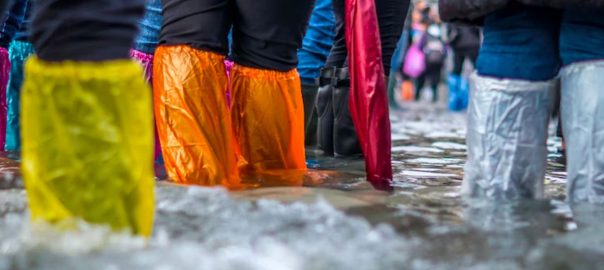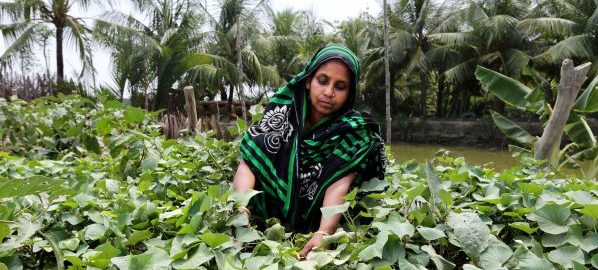
USAID’s work with the private sector can help accomplish greater scale, impact, and sustainability across the Amazon Region of Brazil, Colombia, Ecuador, and Peru. The introduction of the Adi Wayusa energy drink, the support of environmentally sustainable small-scale gold mining and the support of private initiatives to reduce the market of commodity-driven deforestation enterprise, are some of the good examples to contribute to global climate and biodiversity goals.
For years, Indigenous Peoples’ communities living in the Ecuadorian Amazon have started their mornings drinking tea made from leaves of the guayusa plant. The energizing beverage helps sustain them for a full day of working outside. Esthela Nonteno and her family saw an opportunity to bring this natural product to a wider audience, including athletes. In 2020, they created the Andi Wayusa brand of environmentally friendly energy drinks. Now, with support from USAID–funded Amazon Indigenous Rights and Resources (AIRR) project, Andi Wayusa is purchasing machinery to increase production, expand its products, and meet a growing demand.
USAID’s support to Andi Wayusa is an example of Private Sector Engagement (PSE), one of the foundational principles of the USAID 2022–2030 Climate Strategy. It’s also an approach that USAID Amazon Regional Environment Program (AREP) activities, including AIRR, incorporate into their programming to help address climate change in the region. In a development context, PSE refers to collaborating strategically with private sector businesses to accelerate progress toward achieving development outcomes. The private sector is already driving innovative solutions to development challenges. By incorporating PSE into USAID climate activities, businesses and the Agency can help each other tackle challenges that neither could address alone.
For example, AIRR promotes sustainable Indigenous enterprises and provides grants, loans, and market analysis to help them grow. Beginning in 2020, AIRR selected Andi Wayusa and 28 other Indigenous-led businesses in Brazil, Colombia, Ecuador, and Peru to receive support to tap into existing value chains and expand their reach to new markets. Now, these Indigenous entrepreneurs are strengthened to grow their enterprises in a sustainable way while ensuring that their products and services continue to contribute to biodiversity conservation, one of AREP’s goals for the region.
USAID also engages the private sector in a different way through Innovating Solutions for Gold Mining in the Amazon, a public-private partnership between USAID and Conservation X Labs to fund and scale innovative solutions to make artisanal and small-scale gold mining in the Amazon more environmentally sustainable and socially equitable. In early 2022, 13 out of 121 applicants from 22 countries received funding to field test and develop their innovations as part of the Artisanal Mining Grand Challenge: The Amazon. In December 2022, the final awards ceremony will showcase the highest performing solutions. USAID will use the lessons learned from these innovations to inform future programs.
In addition Amazonia Connect, launched in August, seeks to reduce commodity-driven deforestation and associated greenhouse gas emissions by working with suppliers of international and domestic agro-commodity companies to produce verified low-carbon and deforestation-free products in Brazil, Colombia, and Peru. The companies that have invested directly into the activity will then purchase the products to fulfill their international deforestation-free commitments. As banks usually perceive investments in smallholder agriculture as high-risk, high-cost, and low-return, the private sector’s participation unlocks sustainable finance opportunities and enables access to inputs, services, and credit that otherwise may be difficult for companies to attain. As USAID Chief Climate Officer Gillian Caldwell explained after the first Amazonia Connect partners meeting, AREP, though Amazonia Connect, is “working [with the] private sector and local communities to reduce deforestation and [GHG] emissions from agricultural production in the critical Amazon region,” an important step for preserving the rainforest’s ability to mitigate climate change.
The Business Case for Collection Landscape Action is convening private sector actors, governments, and local producers and civil society organizations in Brazil, Ecuador, Peru, and Indonesia to address commodity-driven deforestation and contribute to global climate and biodiversity goals. Through its support for multi-stakeholder planning at landscape and subnational scales, the project will promote improved sourcing, investments, and execution of new strategies to prevent forest loss for more than 300 companies and investors. Together, USAID and the private sector will help reduce greenhouse gas emissions at a faster rate than they would alone.
AREP is using USAID’s market-based, enterprise-driven approach to PSE to achieve better climate and development outcomes.






